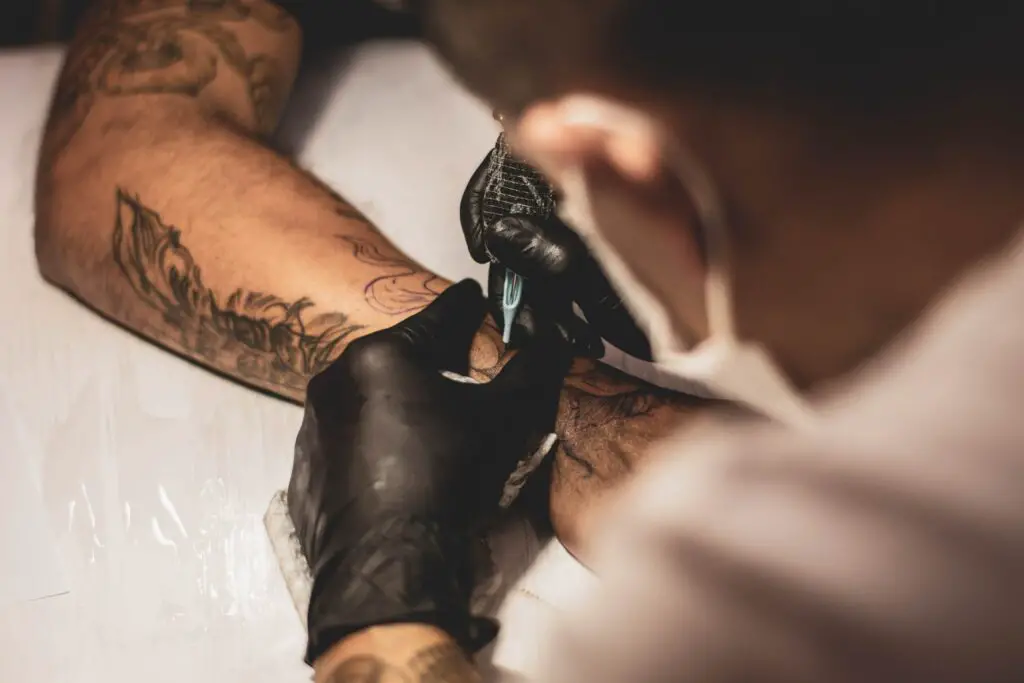What Jobs Don’t Like Tattoos? In recent years, tattoos have experienced a significant surge in popularity, transcending societal boundaries and becoming a prominent form of personal expression. What was once considered a niche or rebellious form of body art has now evolved into a mainstream cultural phenomenon, embraced by people from all walks of life. This growing acceptance and prevalence of tattoos can be attributed to various factors, such as increased visibility in popular media, the rise of tattoo artists as influencers, and the changing perspectives on individuality and self-expression.
As tattoos have become more commonplace, so too have the attitudes toward them in society. Once associated with stigma and stereotypes, tattoos were often viewed as taboo, especially in professional settings. However, as the world becomes more accepting of diverse forms of self-expression, attitudes towards tattoos have shifted dramatically. Today, tattoos are recognized as meaningful symbols of personal stories, memories, and passions, highlighting an individual’s unique identity.
While tattoos are celebrated as a form of creative expression in many social circles, the workplace can present a different set of considerations. Understanding tattoo policies in professional settings has become increasingly important for individuals seeking employment or aiming to advance their careers. Different industries and organizations may have varying viewpoints on visible tattoos, and navigating these policies can impact job opportunities and professional growth.
In this article, we will explore the growing popularity of tattoos, the evolving attitudes towards tattoos in society, and most importantly, the significance of understanding tattoo policies in the workplace. By delving into these aspects, we aim to provide valuable insights for individuals looking to strike a balance between self-expression and professional aspirations in an ever-changing world.
Contents
Jobs with Stricter Tattoo Policies
- Corporate or Professional Settings:
- Client-Facing Roles: In corporate settings, employees who regularly interact with clients are often expected to maintain a polished and professional appearance. Visible tattoos might be discouraged to uphold the company’s desired image and brand identity, which may be perceived as more conservative or traditional.
- High-Level Executive Positions: Similarly, high-ranking executives and leaders in corporate environments might be subject to stricter dress code policies, including restrictions on visible tattoos. This is to project an image of authority, professionalism, and corporate conformity.
- Government and Civil Services:
- Law Enforcement: In the field of law enforcement, visible tattoos may be discouraged or restricted due to the emphasis on uniformity and discipline. The uniform appearance of police officers is designed to convey authority and establish a sense of trust and respect in the community.
- Military and Armed Forces: The military often has strict policies regarding tattoos, particularly visible ones. Tattoo regulations are aimed at maintaining uniformity and a cohesive image within the ranks, fostering a sense of unity and discipline.
- Healthcare and Medical Fields:
- Impact on Patient Interaction: In healthcare settings, including hospitals and clinics, visible tattoos might raise concerns among patients and their families. Some individuals may perceive tattoos as unprofessional or associate them with negative stereotypes, potentially impacting the level of trust in medical professionals.
- Stereotypes and Misconceptions: Despite the increasing acceptance of tattoos in society, certain stereotypes persist in the medical field. Visible tattoos on healthcare providers could inadvertently reinforce negative assumptions about competence and dedication, which could influence patient perceptions.
- Teaching and Education:
- Maintaining a Professional Image: Schools and educational institutions often place a premium on presenting a professional image to students, parents, and the community. Teachers with visible tattoos might face challenges in projecting a conservative and responsible role model for their students.
- Parental Perceptions and School Reputation: Some parents may hold traditional views regarding tattoos and could express concerns about their child’s teacher having visible tattoos. Schools, in turn, might consider the potential impact on their reputation and parent satisfaction.
- Financial Services and Banking:
- Client Trust and Perception: In the financial services industry, client trust and confidence are paramount. Visible tattoos may be perceived as detracting from a sense of reliability and professionalism, potentially affecting business relationships.
- Conservative Dress Codes: Financial institutions often maintain conservative dress codes to convey stability and reliability to clients. Visible tattoos might not align with the desired image these companies wish to project to their customers.
It’s important to note that while certain industries or job roles may have stricter tattoo policies, attitudes are continually evolving. Some companies and organizations are becoming more open to diverse forms of self-expression, including tattoos, as they recognize the value of embracing individuality while maintaining professionalism. As such, it’s always beneficial for job seekers to research specific company policies and cultural norms before making decisions about their tattoos in the workplace.

Industries with Specific Tattoo Restrictions
- Airline Industry:
- Cabin Crew and Flight Attendants: The airline industry typically maintains specific grooming and appearance standards for cabin crew and flight attendants. Visible tattoos might be discouraged or required to be covered during working hours to maintain a polished and professional image for passengers.
- The Airline’s Brand Image: Airlines often invest heavily in building their brand identity and projecting a consistent image to the public. Tattoos that are visible on cabin crew members could potentially be seen as conflicting with the airline’s desired image of sophistication, reliability, and safety.
- Hospitality and Service Industry:
- High-End Establishments: In upscale hospitality settings, such as luxury hotels, fine dining restaurants, and exclusive resorts, maintaining an elegant and refined ambiance is crucial. Visible tattoos on staff members might not align with the establishment’s upscale image and the expectations of discerning customers.
- Customer Perception and Expectations: The service industry places a strong emphasis on customer satisfaction and perception. Some customers may have traditional views on tattoos, and visible body art could affect their experience or impression of the establishment.
- Legal Professions:
- Lawyers and Legal Professionals: In the legal field, where appearances and professionalism carry significant weight, visible tattoos might be viewed with caution. Lawyers often interact with clients, colleagues, and judges, and a conservative appearance is generally expected to maintain credibility and authority.
- Implications for High-Profile Cases: In high-profile legal cases, where public perception and the image of the legal team matter, visible tattoos on lawyers might receive scrutiny from the media and the public. To avoid distractions or potential biases, some law firms may have policies against visible tattoos.
What Jobs Don’t Like Tattoos? Understanding the Reasons Behind Tattoo Policies
As workplaces establish policies regarding visible tattoos, several underlying reasons contribute to their decisions. These policies aim to strike a balance between allowing individual expression and maintaining a professional and cohesive work environment. Here are the key reasons behind tattoo policies in the workplace:
Maintaining a Professional Image:
Employers often view a professional appearance as critical to projecting a sense of credibility, competence, and trustworthiness to clients, customers, and stakeholders. Visible tattoos, depending on their content or placement, can be seen as detracting from this desired image, especially in formal or client-facing roles.
Customer and Client Perception:
Businesses understand the significance of customer perception in maintaining positive relationships and fostering loyalty. Some customers or clients might have reservations or negative associations with visible tattoos, potentially impacting their trust and confidence in the company or its employees.

Uniformity and Discipline:
In certain industries or professions that require a unified and disciplined appearance, such as law enforcement or the military, tattoo policies are designed to promote a cohesive team identity. Uniformity in appearance can also enhance a sense of belonging and cooperation among employees.
Health and Safety Considerations:
Some workplaces may have tattoo policies in place for health and safety reasons. For example, in food handling or healthcare settings, visible tattoos could be discouraged due to concerns about potential contamination or hygiene issues.
Stereotypes and Preconceptions:
Despite changing societal attitudes towards tattoos, some negative stereotypes and preconceptions about individuals with visible tattoos persist. Employers might be wary of potential biases or judgments from customers or colleagues, leading to policies aimed at minimizing these potential impacts.
The Impact of Changing Social Norms
As society undergoes cultural shifts, attitudes towards tattoos have evolved significantly over the years. These changing social norms have had a notable impact on various aspects of the workplace environment and organizational policies. Here are some key ways in which changing social norms have influenced the perception of tattoos in the workplace:
- Shifting Attitudes Towards Tattoos: In the past, tattoos were often associated with rebellion, counterculture, or certain subgroups. However, as more people from diverse backgrounds and professions embrace tattoos, societal perceptions have transformed. Tattoos are now commonly seen as a form of personal expression and artistry, rather than indicators of unprofessionalism or negative character traits.
- Progressive Companies and Inclusive Policies: Forward-thinking companies have recognized the importance of fostering a diverse and inclusive workplace. As part of this effort, some organizations have adopted more lenient tattoo policies that respect employees’ individuality while still adhering to appropriate professional standards. Progressive companies understand that employees with tattoos can bring valuable skills and perspectives to the table, contributing to a vibrant workplace culture.
- The Role of Diversity and Inclusion Efforts: The push for diversity and inclusion in the workplace extends to encompass various aspects of employees’ identities, including their appearance and personal choices. As companies actively seek to create a welcoming environment for employees of all backgrounds, they may reconsider strict tattoo policies that could inadvertently exclude qualified individuals.
- Encouraging Self-Expression and Creativity: With changing social norms, employers are increasingly acknowledging the importance of supporting employees’ self-expression and creativity. Tattoos, as a form of artistic expression, are seen as an extension of an individual’s identity. Companies that value these traits may encourage employees to express themselves while maintaining a professional demeanor.
- Addressing Individuality in Client-Facing Roles: In industries where client interaction is crucial, companies recognize that individuality can enhance customer relationships. Rather than enforcing a rigid appearance standard, some businesses may allow employees in client-facing roles to display tattoos, provided they align with the organization’s values and are not offensive or distracting.
While the impact of changing social norms is evident, it is essential to recognize that not all workplaces have fully adapted their policies to reflect these shifts. Some traditional or conservative industries may still uphold strict tattoo regulations. Moreover, individual company cultures and perceptions can vary widely, even within the same industry. As societal attitudes continue to evolve, companies are continually reevaluating their tattoo policies to strike a balance between fostering an inclusive workplace and maintaining professional standards. Employees seeking to express their individuality through tattoos should consider researching company policies and assessing how their choices align with the workplace culture before making decisions about visible body art.

Coping with Tattoo Policies in the Job Search
Navigating the job search process can be challenging, especially for individuals with visible tattoos. However, there are several proactive steps that job seekers can take to effectively cope with tattoo policies and increase their chances of securing their desired positions. Here are some strategies to consider:
- Researching Company Policies: Before applying for a job or attending an interview, it’s essential to thoroughly research the company’s policies regarding visible tattoos. Companies may have specific guidelines related to the visibility and content of tattoos, which can vary widely depending on the industry and company culture. Understanding these policies in advance will help job seekers assess whether their tattoos align with the employer’s expectations and decide how to proceed accordingly.
- Considering Tattoo Placement and Visibility: If a company has a strict tattoo policy, job seekers may consider the placement of their tattoos to make them less conspicuous during work hours. For instance, tattoos on the upper arms, legs, or torso can often be easily covered with appropriate attire. By strategically choosing where to place tattoos, individuals can strike a balance between expressing their individuality outside of work and adhering to workplace guidelines.
- Employing Temporary Tattoo Covers: Temporary tattoo covers, such as concealers, sleeves, or makeup products, can be valuable tools for job seekers during the application process or in workplaces with strict tattoo policies. These covers can help hide tattoos during interviews or while at work, allowing individuals to present a more conservative appearance when necessary. Temporary covers are particularly useful in industries where client interaction or professional image is crucial.
- Being Honest and Transparent: During the interview process, if the company has no visible tattoo policy, job seekers may choose to be open about their tattoos. Being transparent about tattoos professionally and confidently can demonstrate honesty and authenticity to potential employers. In progressive and inclusive work environments, visible tattoos might not be a significant concern, and expressing one’s true self can be positively perceived.
- Showcasing Professionalism and Skills: While tattoos can be an important form of self-expression, job seekers should ensure that their qualifications, skills, and professionalism take center stage during the job search. Emphasizing one’s capabilities and experiences will demonstrate to employers that tattoos do not interfere with the individual’s ability to excel in the role.
Conclusion
As the popularity of tattoos continues to rise, the workplace landscape has undergone significant transformations in its attitudes toward visible body art. Understanding and respecting tattoo policies in different industries and companies is essential for job seekers looking to navigate the job market successfully. Throughout this journey, several key takeaways can help individuals cope with tattoo policies and maintain a balance between self-expression and professionalism.
Firstly, respecting workplace policies and norms is crucial in any job search. Companies establish these guidelines to create a cohesive and professional environment that aligns with their brand image and values. Adhering to these policies demonstrates a candidate’s ability to adapt and adhere to organizational standards, showcasing their commitment to being a valuable team member.
Secondly, embracing individuality within professional boundaries allows job seekers to strike a balance between expressing their personality and aligning with workplace expectations. Strategically considering tattoo placement and utilizing temporary covers when necessary enable individuals to showcase their unique identity outside of work while adhering to a more conservative appearance when required.
Lastly, navigating career paths with tattoos requires a proactive and honest approach. Being transparent about tattoos during the interview process can be a reflection of authenticity, which is highly valued in many modern workplaces. Additionally, highlighting professional skills, qualifications, and experiences can reinforce the message that tattoos do not define an individual’s capabilities or dedication to their work.
As societal norms around tattoos continue to evolve, so do workplace attitudes. Progressive companies recognize the value of diversity and individuality, embracing employees with visible tattoos who contribute unique perspectives and creativity to the workplace. Therefore, job seekers should carefully research prospective employers to find organizations that align with their values and celebrate diversity.
More Links:





